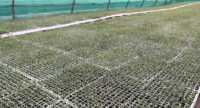Satellite technology
Innovative irrigation projects launched in Mosul to combat climate change
MOSUL – A team from the Agricultural Technical College in Mosul, consisting of seven professors and engineers, has introduced two innovative irrigation projects aimed at combating the severe climate change impacting Iraq and the broader Middle East. These projects leverage advanced equipment and technologies, including the Internet and satellites, to enhance irrigation practices.
The first project focuses on reducing agricultural water consumption by implementing a drip irrigation system that incorporates Internet of Thingsphase technology and simulation techniques. The second project explores subsurface irrigation, which is compared to traditional methods by monitoring soil salinity and moisture levels. This system utilizes American-made devices and sensors that facilitate remote internet-based operation without direct field access.
These initiatives were conceptualized in 2021 by Dr. Issam Mahmoud, Head of the Desertification Control Technology Department at the college. Dr. Mahmoud and his team, supported by the Water Resources Directorate, executed the projects on a one-dunam field (approximately 1,000 square meters) in the Rashidiya area of Mosul, cultivating potatoes and grapes. The potato harvest was successfully completed a month ago.
Mahmoud Abdulwahid, Head of the Irrigation Projects Study Department, detailed the projects’ scope: “At the Water Resources Studies Center, we are working on two research projects. The first is controlling irrigation water using IoT technology, and the second is comparing prevailing irrigation methods with subsurface irrigation,” he told 964media. “The process involves measuring soil moisture using sensors and data-gathering devices through a website. Data on salinity is collected through other devices, after which water is released via remote control using American-made equipment.”
Abdulwahid emphasized the projects’ potential to optimize water usage: “This project allows determining soil moisture levels and the amount of irrigation needed, aiming to reduce water consumption.”
The team plans a phased approach to water sources: initially using freshwater, then introducing saline groundwater in the second year to support local farmers, and finally blending fresh and groundwater in the third year to balance salinity for optimal crop productivity.
“We have completed the first phase and are currently analyzing the results,” Abdulwahid added, noting the use of devices certified by American academic institutions for precise monitoring and data collection.
Maan Abdulameer, an agricultural engineer on the project, explained their methodological approach, which includes using data from a meteorological device on the field and employing an electronic application called Hydrus for simulation-based irrigation control.
The projects come at a critical time as Iraq contends with significant desertification, affecting 39 percent of its land. Recent years have seen reduced rainfall and drying rivers, leading to widespread arid conditions and intensifying the need for innovative agricultural solutions.

Over 50,000 tons of agricultural produce sent from Duhok to the rest of Iraq

Iraq's Ministry of Agriculture distributes over 200,000 seedlings to combat desertification

